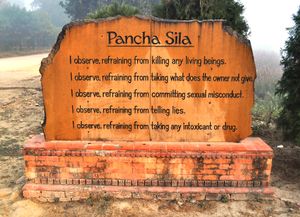Five lay vows: Difference between revisions
Jump to navigation
Jump to search
No edit summary |
No edit summary |
||
| Line 1: | Line 1: | ||
[[Image:Pancha_sila.JPG|thumb|A tablet with an inscription of the five vows at [[Lumbini]] ]] | [[Image:Pancha_sila.JPG|thumb|A tablet with an inscription of the five vows at [[Lumbini]] ]] | ||
The '''five lay vows''' (Skt. ''upāsakaṃvara''; Tib. དགེ་བསྙེན་གྱི་སྡོམ་པ་, [[Wyl.]] ''dge bsnyen gyi sdom pa'') are: | The '''five lay vows''' (Skt. ''upāsakaṃvara''; Tib. དགེ་བསྙེན་གྱི་སྡོམ་པ་, [[Wyl.]] ''dge bsnyen gyi sdom pa'') — lay people can take one or several of these five vows or precepts, which are the basic vows that underpin the Buddhist way of life. They are the vows: | ||
#not to kill, | #not to kill, | ||
#not to steal, | #not to steal, | ||
Revision as of 11:11, 12 February 2024

The five lay vows (Skt. upāsakaṃvara; Tib. དགེ་བསྙེན་གྱི་སྡོམ་པ་, Wyl. dge bsnyen gyi sdom pa) — lay people can take one or several of these five vows or precepts, which are the basic vows that underpin the Buddhist way of life. They are the vows:
- not to kill,
- not to steal,
- not to lie,
- not to commit sexual misconduct, and
- not to take any intoxicants.